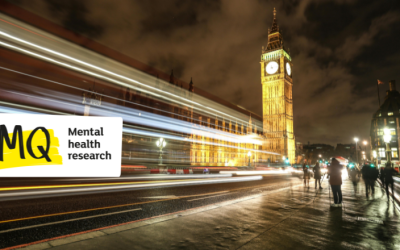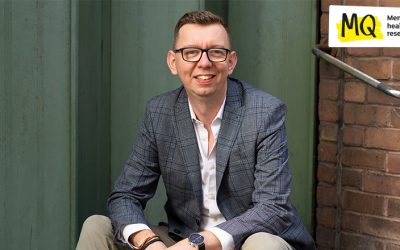Content warning: this post contains references to suicide and self-harm
When Dr. Christine Yu Moutier talks about the impact of suicide, she does so not just as an expert in the field, but from her own personal experience.
A psychiatrist who began her career at the University of California - San Diego, Christine was drawn to her work after losing several physician colleagues to suicide.
Today, she is the Chief Medical Officer of the American Foundation for Suicide Prevention (AFSP), a nationwide community using research, education and advocacy to advance its goals. She's also a member of the steering committee for MQ's Gone Too Soon initiative, which explores links between physical health and suicide.
Dr. Moutier was the keynote speaker at last week's MQ Data Science meeting
The day-long gathering brought together international experts exploring the ways data can support and enhance suicide and self-harm prevention efforts.
Her talk offered a wide-ranging look at the science and new directions in US suicide prevention during the COVID-19 pandemic, from a "status update" on trends and opportunities to a snapshot of AFSP's prevention strategies.
Data has helped Dr. Moutier track mental health and suicide risk throughout the pandemic - and like so much to do with COVID, the results are complex.
In early 2020, the US Centers for Disease Control (CDC) launched its Household Pulse Survey on mental health, which Dr. Moutier says has been "an incredible source of data for us," reaching "between 60,000 and 90,000 American adults almost every month, so it's quite an incredible effort."
"They ask questions like, 'Are you currently taking a psychiatric medication or in therapy?' At the beginning of the pandemic, about 22% of the American population said 'yes' to that question. Now, it's over 26%." The percentage of respondents seeking mental health care but unable to access it also rose slightly, to 12%."
For suicide alone, there are signs of a small but dramatic shift. Dr. Moutier notes CDC statistics showing that US suicide rates increased steadily from 2000 to 2018, then started to inch down in 2019. That decline continued into 2020.
The concerning thing is that the decrease wasn't reflected across all demographic groups.
While the number of suicides fell for people middle-aged and older, they rose 4.5% among young adults between 2019 and 2020 - a statistically significant increase. And the declines for the overall population were not seen among Hispanic, American Indian, Alaskan Native and Black men.
It isn't just the data -- the factors affecting suicide risk during COVID-19 are complicated, too.
You might imagine that the pandemic's higher levels of stress would make people more vulnerable to suicide. In fact, the reality is more nuanced.
"Suicide risk is not only related to the pandemic," says Dr. Moutier, explaining that internal biological and psychological factors interacting with social and environmental factors may all have a role. It's a message she's worked to convey to news outlets, particularly in response to sensational or misleading stories.
"And we certainly don't ever mean to say that a family history or genetics are destiny in terms of suicide-related outcomes," she says. "But it is something to be aware of."
Drawing on scientific advances as well as the learned experience of people affected by suicide loss, AFSP and partners have also helped provide journalists with scientifically accurate and appropriate language for reporting on the topic. That led to an official change in the Associated Press Stylebook, the main reference source for US newsrooms.
"We now clearly understand that the phrase 'commit suicide' just does not make sense, because it describes a morally reprehensible act," Dr. Moutier says. Plain language such as "died by suicide" is the recommended alternative.
While the pandemic has come at a terrible cost, it has also produced some "silver linings."
For instance, the way conversations about suffering, distress and disruption have been normalized during COVID-19 can help people whose lived experience reflects a similar reality. It creates a sense of validation and connection that may protect against suicide risk -- and it needs to be kept in mind when developing new policies and programs.
The pandemic also changed the dialogue around health equity, an issue marginalized groups know all too well, but one that's often sidelined by those untouched by it. And it raised the profile of telehealth in the US, although legal hurdles remain.
Suicide risk is a key focus for MQ, and the research we fund allows mental health professionals to respond with evidence-based care. "Giving to MQ helps researchers make discoveries that can change or save lives," says John Herrmann, the founder and chairman of the MQ Foundation.
Watch Christine's keynote speech from the MQ Data Science meeting.



